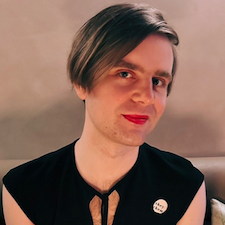How to Not Know Things
Listen
In May 2010, I was offered a job at the Apple Store at the King of Prussia Mall, one of the biggest shopping destinations in the United States. It was my first and only retail job, and in my three months working there, I became the top-selling salesperson (or as Apple called it, “Specialist”) on the sales floor (or as Apple called it, “The Red Zone”). I did this by sharing my passion, knowledge, and care with every customer. But I also did it by Googling a lot, by installing lots of apps for customers to check that they’d work, and by getting a little better every day.
My training for the job involved being clapped at a lot while donning the signature blue T-shirt in a room full of folks learning how to sell iPhones and iPads and create Apple “customers for life”. Our teacher was a blond-haired, blue-eyed surfer-turned-computer salesman named JB who wore white earbuds as a necklace. As he taught from the printed material and screened Apple videos for the class, he kept harping on one point that’s stuck with me in the decades since.
I don’t know, let’s find out
JB taught us that there was no way we could know everything there is to know about every Apple product, let alone every app that runs on them, and every way they can fail. He taught us that rather than making up an answer, guessing, or shrugging our shoulders, we should instead say, “I don’t know, let’s find out”. Admitting that we didn’t know was the first step. Then, we were to find out together with the customer by walking over to a Mac and looking up the answer or pulling in another employee who might know the answer.
This one sentence from a retail training manual contains many insights that I’ve relied on every day since in my personal and professional life:
- It’s okay not to know because we can’t know everything, and we shouldn’t expect that of ourselves.
- It’s better to admit our ignorance than get things wrong.
- Even if we think we might know, it’s okay to double-check because getting it right matters.
- People trust us more when we admit our shortcomings.
- Learning is better together.
- People love to see and share in the process of discovery.
- People trust information more when we share the way we found it.
- Memorizing isn’t as important as knowing how and where to look things up.
Fuck around and find out
This is another similar phrase that’s become popular since 2020, especially sarcastically in leftist circles. But it’s legitimately valuable advice because sometimes, no amount of Googling or reading about a topic will get you to the answer. Sometimes, trial and error is the only way to learn. By experimenting or fucking around, we learn together by playing together. We do a little science and discover something new about the world that we can share.
Many of the answers to life’s daily questions can be uncovered using these thought technologies. Are you faced with a tricky question in an interview for a new job? Try being honest with the interviewer that you don’t know the answer and explain how you’d research it in detail. Not sure what your gender is? As Mattie Lubchansky suggested on a recent live episode of the Gender Reveal podcast, “fuck around and find out”. Try on makeup, a new set of pronouns, or a binder, and see how it feels!
Let’s make better mistakes tomorrow
Just because you don’t know something today doesn’t mean you won’t know it tomorrow. If you cultivate an attitude that faces the unknown with curiosity, sharing, and experimentation, rather than blame, fear, and stubbornness, you may get a bit smarter every day. You’ll learn much more by remaining open to new discoveries and sharing that journey with the people around you, at work and in the rest of your life. And that continuous improvement, or kaizen, will accumulate like compound interest. It will, in the words of Mike Monteiro, let us “make better mistakes tomorrow”.
What don’t you know right now? What do you want to find out? Let’s do it together.
